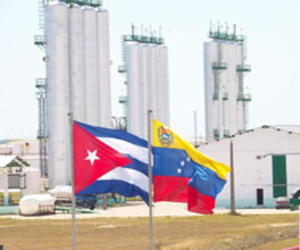Are Russia and China racing for Cuba’s refineries?
- Submitted by: manso
- Business and Economy
- 01 / 06 / 2011

By Jorge R. Piñón. Chinese and Russian companies will be exploring for oil in the Orinoco Basin soon, and within the next five years they will begin exporting their respective equity production of what eventually will be more than 400,000 barrels per day of 32 degrees API upgraded Venezuelan crude.
This, in turn, brings up the issue of refining. Most of the Venezuelan crude oil will find a home within the existing refining capacity of its “natural” market in the Caribbean and Gulf of Mexico basins. As we have stated earlier (see Cuba Standard Nov. 24), Cuba gives oil refiners a strategically preferential location within a 5-to-7-day transit from the United States, the world’s largest consumer and importer of petroleum products. The island’s location also allows refiners to take advantage of the Pacific Rim markets via the soon-to-be expanded Panama Canal, and to take advantage of European and U.S. petroleum products arbitrage.
Recent press reports indicate an interest in Cuba’s future refining assets by two Russian companies, Lukoil and Sintez Group.
The Sintez Group is a Moscow-based oil and gas exploration company controlled by Russian oligarch Leonid Lebedev. Lukoil, Russia’s only privately held oil and gas company, ranks third in the country, after government-controlled giants Gazprom and Rosneft. It is the world’s 15th-largest oil and gas company based on reserves, surpassing international majors such as Exxon, Chevron, BP and Shell. A subsidiary, Lukoil America, operates more than 2,000 gasoline retail sites in the Northeast region of the United States.
Lukoil has had an interest in Cuba’s downstream oil sector for a number of years, but its financial relationship with U.S.-based Conoco-Phillips has held back any major push toward a possible deal on the island. Conoco’s divestment of its 20-percent stake in Lukoil last year freed the Russian oil company to deal with Cuba without the risk of running afoul of the U.S. embargo.
In 2005, Lukoil signed a 40/60-percent joint venture agreement with Venezuelan state company PdVSA for the development of Block 3 in the ultra-heavy oil area of Junín, with proven recoverable reserves of more than 2 billion barrels. PdVSA expects Junín Block 3 to be producing around 200,000 barrels per day within three years.
Lukoil also partnered with Gazprom, Anglo-Russian joint venture TNK-BP, Rosneft and Surgutneftegas in a Russian consortium which holds 40 percent in Junín Block 6. PdVSA, which holds 60 percent, estimates 52 billion barrels of oil in place with an eventual production of 450,000 barrels oil per day.
Press reports indicate that China has an option, or at least a preferential right of first refusal, in the Cuban-Venezuelan joint venture refinery at Cienfuegos (eventually with a capacity of 150,000 barrel per day). This leaves the $4.3 billion, 150,000-barrel, deep-conversion Matanzas refinery project available for evaluation by the Lukoil-led Russian consortium.
Everything seems to indicate that not only in upstream, but also in downstream oil and gas development, Cuba is following a strategically focused policy of diversifying its joint venture partners and smartly not putting all of its eggs in one basket.
Jorge R. Piñón was president of Amoco Corporate Development Company Latin America from 1991 to 1994; in this role he was responsible for managing the business relationship between Amoco Corp. and regional state oil companies, energy ministries and energy regulatory agencies.
Source: www.cubastandard.com/2011/01/06/pinon-on-energy-russia-and-china-racing-...
Comments